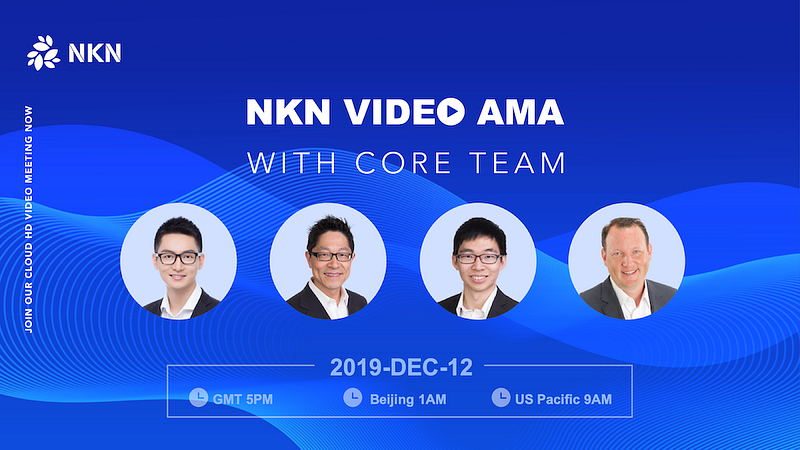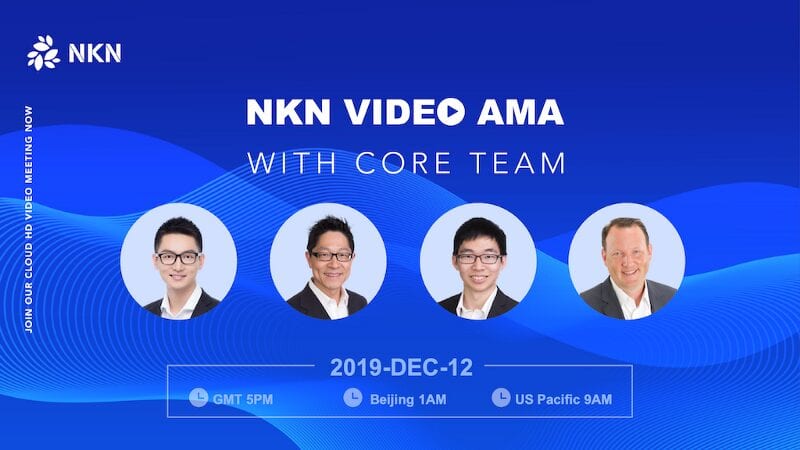
Question #1
My question is already in an NKP too ([NKP-0003] Providing https/wss endpoint for EVERY NKN node), but I’m curious to know the official stance on this and what to expect. I personally love to experiment with NKN in a commercial environment (nothing big) but I can’t even begin making a suggestion if HTTPS isn’t possible. Currently NKN is only usable in HTTP contexts and non-web contexts. While that’s still awesome, I kinda hope for a HTTPS solution here. How does NKN plan to tackle this and what‘s the time frame for it?
Answer:
Timely question. This solution has been implemented in PR660 together with a customized version of DNS server. It should be available soon in the next release. More Details are available on the NKN Forum for NKP-0003.
Question #2
Totally different question but sparked by the HTTPS core issue (SSL certificates). There seems to be a dire need in the distributed world to have some means of a decentralized certificate authority. Does NKN see a role for itself here? If I’m correct, the NKN network is perfectly suited to fulfill this role and it could mean that NKN would become very attractive for other decentralized projects to use as a means of getting certificates. I know there’s more to it then just starting a certificate authority. You have to be trusted by other root authorities and due to the distributed nature, some new protocols probably have to be created to make that a smooth integration.
Answer:
In the long term, blockchain is suitable for decentralized Certificate Authority (CA). The reason we have CA is that there is a need to share some public information (certificate) from a trusted source (CA). Blockchain, in fact, is perfect for storing such information. Once the data is stored on the blockchain there is no need for any centralized authority to sign the data as long as we can agree on the single source of truth. The problem is really not a technical issue, but more of an adoption issue. Network libraries and browsers would need to implement this new standard and may take many years for this new architecture to be adopted.
Question #3
Are you able to say how many potential clients you’re working with or currently testing for? It sounds like there could be a good few in the pipeline. Both for nCDN and TUNA?
I understand you have an NDA in place relating to perspective customers. Would it be possible to briefly update the community in relation to the characteristics of these potential partnerships such as demographic, turnover, industry sector, and country etc.?
Answer
Over the last few months we have had lots of good traction and happy to provide an overview of our commercialization. We currently have a suite of products which we call Communication as a Service (CaaS). CaaS is the essential communication tool set for enterprises, which unifies all of the individual products that we have built. This suite includes:
- d-Chat group & private messaging
- nFTP fast global file transfer
- nCDN rich media content delivery
- nVPN for enterprise secure interconnect between branch offices
- nShell manage remote machines
- TUNA — open marketplace for software services
For nCDN, we have been testing nCDN in a commercial trial with one of the top video streaming providers in China for the past 3 months. We are excited to share that nCDN has recently passed the technical evaluation and will now be moving forward with the commercial negotiation.
For file transfer, We have been working with a Network Attached Storage (NAS) vendor to enable customers to share content such as photos and videos directly from their home NAS to their mobile app. This uses TUNA and the NKN network to provide this service and has already been deployed to more than 13,000 NAS devices and will roll out to more customers in the future. This is real world adoption at scale and is one of the largest deployments built on top of NKN to date.
We have also recently signed a collaboration agreement with a division of China Mobile in Southern China. This agreement covers collaboration in key areas such as cloud computing, network, and blockchain. In addition, NKN will be using China Mobile Edge Servers and underlying infrastructure to run NKN applications such as nCDN and nFTP for enterprise customers.
We are excited about these new milestones and will be continuing to drive adoption in 2020.
Question #4
Does NKN have plans to list on Coinbase in 2020, helping the American market get a piece of the pie?
Answer
Exchanges use a number of different factors including financial in their listing decision making. Projects that can show a large volume with interest from the community as well as have proven real world use cases will be easier to list. NKN is well positioned in 2020 to address these factors. With solutions like file transfer that have already seen real world adoption, users will be able to use our own nanopay payment channel to pay for service using NKN token. As we look to expand these solutions next year and offer more opportunities for the community to use our tokens, we will have a strong case in 2020.
Question #5
When can we expect ledger integration for Mainnet tokens?
Answer
We have already conducted extensive internal security reviews, as well as hardened our software during almost 6 months of mainnet. And 3rd party security auditing by a reputable security firm will begin next week. The 3rd party evaluation will take up to 8 weeks to complete and produce a report. Once that is complete and any issues are resolved then we will have full confidence to go to our exchange partners and wallet developers to begin Mainnet token integration efforts.
Question #6
If NKN mining is profitable for single and small hardware users wouldn’t it make sense for large cloud providers to replace those small miners since economies of scale will apply?
Answer
Cloud computing always has a fixed cost which includes the cost of the virtual machine as well as any additional bandwidth. When nodes are run at home, there are no additional costs since often our nodes are run on existing equipment like a raspberry pi or a home computer with an existing internet connection. Therefore, there is still a cost advantage to the single small hardware user. On the other hand, the cloud providers have advantages in operational efficiency and scaling.
Actually we are happy to see a good balance between large cloud providers and individual home hobbyists, which makes the NKN minging ecosystem more distributed and vibrant.
Question #7
There is lots of interest in 5G, what are your plans for 5G and how can blockchain provided by NKN interrupt or enhance 5G?
Answer
NKN takes advantage of the underlying network infrastructure. Therefore, as mobile networks are upgraded to 5G, NKN will have access to 5G performance enhancements such as higher throughput and lower latency. In addition, 5G also introduced Edge Computing and a more decentralized network architecture. This fits well with NKN’s network topology. To address this, NKN has joined the Telecom Infra Project (TIP) sponsored by Facebook which brings together innovative companies like NKN as well as telecom providers to develop solutions in emerging technologies. NKN participates in the Edge Compute working group in TIP.
Question #8
Would you comment on the critically cold reception on the recently launched Google Stadia (a gaming streaming service from Google)? When it was expected to be the next revolution in gaming industry, it comes with a number of expected problems and limitations. Since NKN wants to tackle the same space among many others, would these limitations (e.g: bad latency) be an obstacle and make your team just shrug off the idea of streaming games?
Answer
While Google itself has one of the best networks in the world, it still does not guarantee that each end user has a good experience. The bottleneck is often congestion from one of many Internet Service Providers between the end user and Google’s network. Therefore the issue is more of an internet infrastructure problem rather than google Stadia’s problem. The same issue will need to be addressed by other emerging game streaming services as well. Microsoft ProjectX offers a game streaming catalogue as well. We plan to take the lessons learned from both Google Stadia and Microsoft ProjectX for our own solution.
Question #9
Do you have any updates on staking and token economic model enhancements?
Answer
Regarding staking, we looked at the best practice of other projects, discussed internally and also consulted with professional staking as a service companies. The projects that are best suited for staking are Proof of Stake blockchain with inflational token issuance. NKN is neither. The additional staking rewards have to come from somewhere, otherwise it is not sustainable.
We believe the best economic enhancement for the token economy is really to spur wide adoption of NKN token for Communication as a Service solutions suite. When more users are using NKN network, paying and getting paid by NKN, we will see the tide lifting all boats (token user, miner, holder, project team and foundation).
In addition, once we start to generate commercial revenue and profits, we may use some of the profits to buy back NKN token.
Closing words and outlook for 2020
Yanbo
We are confident in our future, with a solid commercial use case we are prepared to deliver in the next year.
Yilun
We have achieved quite a lot in 2019 on the software infrastructure level. We have already created the largest blockchain network in the world and its working well. Now is the time to make use of this infrastructure and bring the benefits to real users who may not even realize they are using blockchain at all. One of our biggest goals for 2020 is real-world adoption.
Allen
What I am excited about in 2020 is taking the applications we have developed on top of NKN and getting them into the hands of real users, where they can experience the benefits and make them a part of their daily routine.
Bruce
2020 for NKN is looking beyond Crypto to expand our use cases, increase the amount of users that are actually using our service, and replicate our traction in China for customers in the US, Europe, and the rest of the world. This will provide a good economic system to further develop NKN. By expanding our use cases outside of crypto, we will be more diversified and less dependent on the fluctuations in the crypto markets.

